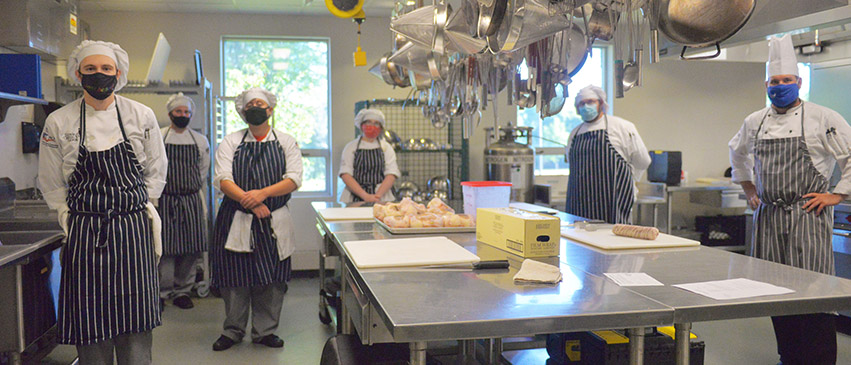
While the pandemic has challenged many business sectors, two of the most severely challenged areas are restaurants and schools. When you combine the two elements, culinary education has faced a particularly challenging landscape. While program enrollment may be down nationwide, there is still a great need for culinary arts and hospitality education. However, it will look different in the COVID-19 world.
Adaptation Through Innovation
Illinois Central College is adapting to this new world through innovation as it educates tomorrow’s food service directors, banquet or executive chefs, head or line cooks, executive sous chefs, food prep workers and bakers, to name a few. ICC’s Culinary Arts Management program allows students to turn their passion into a career by teaching the skills needed to work in a professional kitchen, along with food safety and sanitation protocols in the hospitality industry.
“These unprecedented times have had a large impact on our industry. Fortunately, the culinary scene has always been—and will remain—flexible and resilient,” notes Chef Charles Robertson, ICC professor and program chair. “While COVID-19 has been a big challenge to chefs and restaurateurs, I know the resiliency of leaders in the food industry will prevail.”
When the college was forced to transition to online learning in mid-March, the Culinary Arts Institute moved quickly to keep students learning and engaged. Faculty created take-home “food kit packages” containing the ingredients and recipes needed to prepare dishes, which allowed students to continue hands-on instruction from the safety of their homes while classes were taught virtually.
“We have definitely learned to be flexible,” says second-year ICC Culinary Arts student Haylie Poirier. “We went from all in-person instruction to online lectures and doing labs in our own kitchens. I was taking my meat, poultry and fish class when the transition to online occurred, so I was butchering these products in my home kitchen, which was interesting!”
This fall, ICC culinary classes are following a hybrid format of both online lectures and face-to-face, on-campus labs, with students returning to the state-of-the-art kitchen facility for hands-on learning. Social distancing, specific entry and exit points, and personal protective equipment have been implemented to keep students and faculty safe. “The class sizes are even smaller now,” Poirier adds. “We work more individually, rather than in groups like we did in previous semesters.” Culinary courses where hands-on learning is not required remain online only.
Meanwhile, ICC is preparing for the trickle-down effects the pandemic will have on the culinary curriculum. “There are many factors in flux in preparing students to enter an altered food industry,” says Chef Robertson. “Issues like staffing, what menus will look like, and how businesses will balance delivery versus dine-in are unclear yet. We will see what industry needs are during the recovery period and adjust accordingly. I am confident our program will continue its exceptional status and adapt to the industry’s new reality.”
“I believe carryout, delivery and curbside will remain popular options for quite some time,” Poirier adds. “While food safety and sanitation were already restaurants’ top priority, I expect the measures taken will become even more intense as cases continue spreading.”
World-Class Culinary Education
ICC’s award-winning Culinary Arts Management program was recently re-accredited by the American Culinary Federation Education Foundation’s Accrediting Commission for its Associate in Applied Science degree in Culinary Arts Management. Remarkably, the ICC program was one of only two Illinois culinary schools with the rare Exemplary status—and the only one outside of Chicago.
Likewise, the program received many awards and distinctions in 2019, including the prestigious “Best in the Midwest – Education/Institution/Business/Industry” designation by the Heart of Illinois Hospitality Association. All six nominees for Heart of Illinois (HOI) Chefs Chapter “Student Chef of the Year” were ICC Culinary Arts students or recent graduates, while Chefs Robertson and Keith Shank were nominated for the HOI Chefs Chapter “Chef of the Year,” along with ICC alumni Chefs Golda Ewalt and Amy Carey. Alumnus Chef Josh Adams has also been recognized nationally as a James Beard Award nominee and semi-finalist.
“Even with all the adaptations due to COVID-19, we offer a world-class culinary education with a community college price point,” notes Chef Robertson. “Cooking will always be a universal language—a sauté is a sauté no matter where you live. I am confident our graduates can go anywhere in the world and find a job. The success of our alumni and our high placement rates confirm it.”
Before the pandemic, the need for chefs and cooks was projected to grow at a much faster rate than other occupations until the year 2028, according to the Bureau of Labor Statistics. It is hard to predict the permanent effect COVID will have on industry growth, but ICC’s high placement rate will be especially important in the future. “The success of others in the program gives me assurance I will be prepared and ready to enter my career field,” Poirier says, “and provides hope that a job will be waiting for me at the end of my time at ICC.” PM
To learn more about the ICC Culinary Arts programs, visit icc.edu/culinaryarts.
- Log in to post comments

